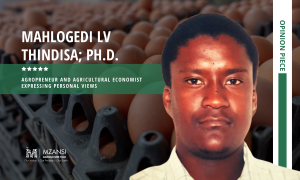Straining agricultural domestic support contradicts both ANC and ANC government priorities

Agriculture is a backbone of any economy in the world and this was evident when every nation, including South Africa, insulated the agricultural sector against COVID-19 crisis. When South Africa, entered into total lockdown in March 2020 to prevent the spread of coronavirus, agriculture was declared an essential sector and was allowed to continue operating. Socially, agriculture is key to sustain livelihoods by supplying food, and economically, agriculture provides intermediate goods that are critical in manufacturing and other secondary sectors. The importance of agriculture is also well acknowledged by every strategic document that has been published by various institutions in the country. In recent times, the African National (ANC) Congress paper titled “Reconstruction, Growth and Transformation” recognized the importance of agriculture. The ANC goes as much as saying the state must strengthen the funding for farmer production, infrastructure, land, water and research and development because agriculture is key for job creation.
The ANC’s view on agriculture as a critical sector for recovery and reconstruction of the economy was also echoed by the National Treasury in its paper “Towards an Economic Strategy for South Africa”. In this paper, NT argued that agriculture is a labour intensive and export-oriented sector that is critical for food security and rural economic development as well as foreign earnings. If agriculture, is considered to be a social and economic strategic sector that can play a lead role in the country’s recovery from COVID-19 economic demises, why is it constantly on a receiving end of heavy budget cuts and general poor support? This question needs to be in the mind of every policymaker and more importantly to those distributing state resources to balance the social, security and economic interest of the country.
On July 21, Minister Thoko Didiza announced that, the budget for the sector has been slashed by R2.4 billion as compared to its initial allocation announced in February 2020. The main affected functions are food security, land redistribution and rural development, the very same areas that have been identified as contributors to rising poverty, unemployment and inequality in the country. This budget cut will further exacerbate these developmental problems. Budget reductions in the food security and farmer support have been happening for a prolonged period, leading to a widening inequality between commercial and emerging farmers in the country. In the past five years, the budget allocation for a food security programme has been growing by just 1.9% on average per annum, which is far lower than the inflation and other programmes of government. Minister Didiza also announced that her department will continue to implement policies and programmes that support farmers, strengthen tenure security, improve market access and accelerate land redistribution, focusing mainly on women and youth. However, progress on these priority areas will be constrained by low budget availability.
There is a general consensus amongst academics, policymakers and business community that agriculture can play a critical role to uplift the South African economy out of the ditch caused by COVID-19, series of economic downgrades and changing climate. However, for agriculture to realize its full potential, that is, growing production both in commercial and communal areas, government must rethink its approach of budget cuts across all sectors. Yes, COVID-19 has affected government income streams, however, the budget allocation must reflect economic priorities and the urge to recover and grow the economy. Agriculture has constantly received low budget allocation since 1995, with its share dwindling from over 5% in 1994 to less than 1.6% in 2020, suggesting that government budget allocation is not aligned with its own strategic thinking as outlined in the National Treasury paper as well as that of the ruling party.
By: Dr Sifiso Ntombela, email: sifiso@namc.co.za; twitter: @Ntombela_SM



















